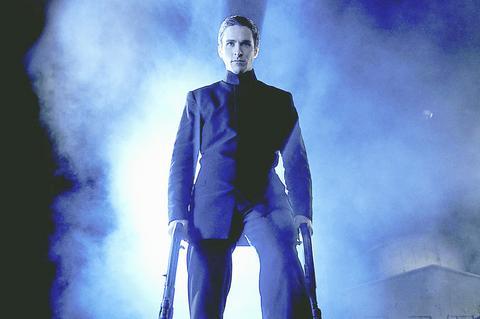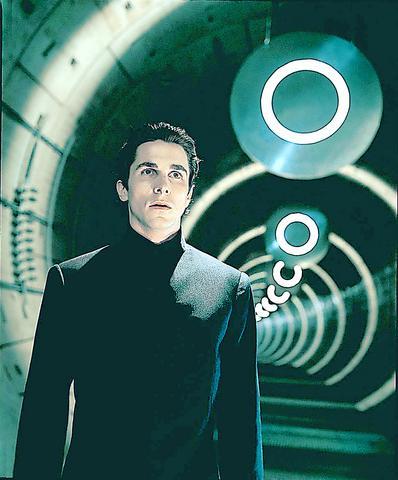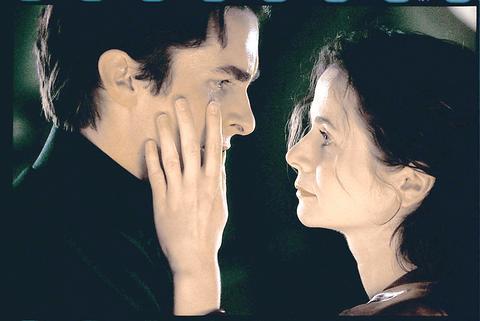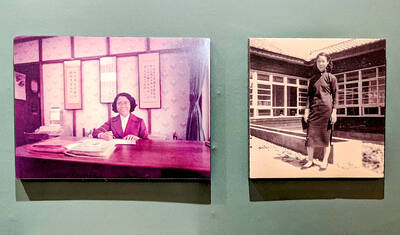In Equilibrium, which takes place in the not too distant future, emotion has been outlawed. But some things are still the same; the Cadillac STS is still available (though masking tape is applied to hide its markings). And it is driven by a new breed of law-enforcement officer called -- and please don't laugh until I finish this -- Grammaton Cleric, assigned to squash the sense crimes of what could be called the emotion underground.
The Clerics -- who are all men, so women are even more repressed -- practice a particularly nasty martial and handgun art called Gunkata. In the near future, I guess, bullets are neither deadly nor photogenic enough to accomplish the job.
One of these men, John Preston (Christian Bale), is at the center of Equilibrium, a ridiculous sci-fi action melodrama and breath mint. If someone left 1984, Fahrenheit 451, Brave New World, Gattaca and the Sylvester Stallone potboilers Judge Dredd and Demolition Man out in the sun and threw the runny glop onto a movie screen, it would still be a better picture than Equilibrium, a movie that could be stupider only if it were longer.

PHOTO COURTESY OF UNIVERSAL
Emotion, it seems, caused a third world war. To prevent a fourth, feelings have been made illegal, done away with by a drug called Prozium, which citizens administer to themselves daily. Based on the slender, concave shape of faces of the future, Prozium is as effective a weight-loss tool as those sandwiches at Subway.
The slender, sleek Preston has repressed everything about himself, including Bale's English accent. He has the mid-Atlantic vowels of one of the DJ's at a Virgin megastore. Devoted and loyal in carrying out the orders of the government, Preston stumbles into the underground when it turns out that one of them was (gasp) right next to him -- his own Cleric partner, whom he executes.
His confidence shaken because he thought himself intuitive enough to know what was going on in the mind of any man, Preston is given an ambitious and perhaps even more empathetic young partner, Brandt (Taye Diggs, whose cheekbones are even more beautiful than Bale's). And there are further fissures in Preston's resolve; his wife was also executed for sense crimes, leaving him a widower with two young children.

PHOTO COURTESY OF UNIVERSAL:
When he starts to have, um, feelings for the beautiful underground member (Emily Watson) he has just arrested, a question arises: Will Preston forsake the road before him for the pursuit of real, live emotion?
Equilibrium is pretty silly stuff. The writer and director, Kurt Wimmer, has obviously made a movie where independent thought has been banished, since the whole picture looks like Ridley Scott's Orwellian Apple commercial from 1984. I'm as up as anyone for a well-staged action sequence, but the punches thrown here make the movie look as if it was based on a video game.
The Clerics' fascist chic wardrobe and their Gunkata will probably have the makers of The Matrix scouring every frame for copyright infringement. The true sleaziness comes after Preston beats a brace of fellow cops to their bloody, picturesque deaths to protect a puppy from execution. Just when you think Equilibrium can't sink any lower, the movie slaughters shame, too.

PHOTO COURTESY OF UNIVERSAL

Following the shock complete failure of all the recall votes against Chinese Nationalist Party (KMT) lawmakers on July 26, pan-blue supporters and the Chinese Communist Party (CCP) were giddy with victory. A notable exception was KMT Chairman Eric Chu (朱立倫), who knew better. At a press conference on July 29, he bowed deeply in gratitude to the voters and said the recalls were “not about which party won or lost, but were a great victory for the Taiwanese voters.” The entire recall process was a disaster for both the KMT and the Democratic Progressive Party (DPP). The only bright spot for

Water management is one of the most powerful forces shaping modern Taiwan’s landscapes and politics. Many of Taiwan’s township and county boundaries are defined by watersheds. The current course of the mighty Jhuoshuei River (濁水溪) was largely established by Japanese embankment building during the 1918-1923 period. Taoyuan is dotted with ponds constructed by settlers from China during the Qing period. Countless local civic actions have been driven by opposition to water projects. Last week something like 2,600mm of rain fell on southern Taiwan in seven days, peaking at over 2,800mm in Duona (多納) in Kaohsiung’s Maolin District (茂林), according to

Aug. 11 to Aug. 17 Those who never heard of architect Hsiu Tse-lan (修澤蘭) must have seen her work — on the reverse of the NT$100 bill is the Yangmingshan Zhongshan Hall (陽明山中山樓). Then-president Chiang Kai-shek (蔣介石) reportedly hand-picked her for the job and gave her just 13 months to complete it in time for the centennial of Republic of China founder Sun Yat-sen’s birth on Nov. 12, 1966. Another landmark project is Garden City (花園新城) in New Taipei City’s Sindian District (新店) — Taiwan’s first mountainside planned community, which Hsiu initiated in 1968. She was involved in every stage, from selecting

As last month dawned, the Democratic Progressive Party (DPP) was in a good position. The recall campaigns had strong momentum, polling showed many Chinese Nationalist Party (KMT) lawmakers at risk of recall and even the KMT was bracing for losing seats while facing a tsunami of voter fraud investigations. Polling pointed to some of the recalls being a lock for victory. Though in most districts the majority was against recalling their lawmaker, among voters “definitely” planning to vote, there were double-digit margins in favor of recall in at least five districts, with three districts near or above 20 percent in